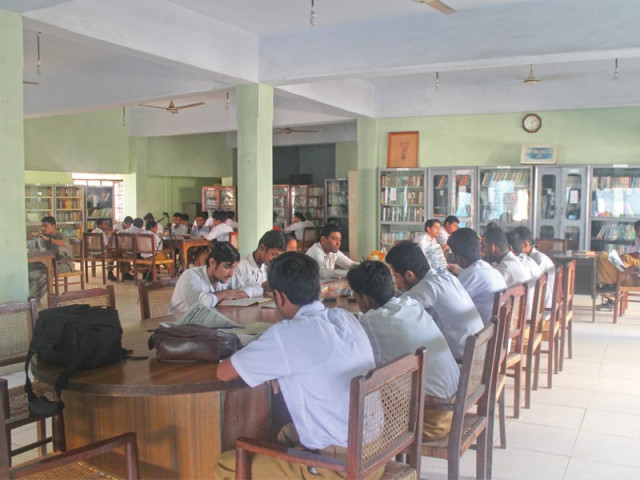Words, not weapons are what Lyari residents want
A number of them seek refuge in area’s largest library.

Despite its crumbling form and meagre resources, the library is the perfect hiding place for those who take solace in words, rather than weapons.
“I want to get educated and represent my [Baloch] people in the navy. I want to show the world that not all five fingers are similar,” says 19-year-old Akram, a student and resident of the area who spends three to four hours in the library almost every day. For Akram, the library is the perfect spot; away from the chaos and distractions of home, where he dreams of a better life.

“I am feeling anxious because I applied for a teaching job yesterday but haven’t heard back yet. So I came here because books calm me down,” says 20-year-old Danish, a second-year student who likes to teach the less privileged in his free time.
Danish has been coming to the library regularly for the past four years but feels that his thirst for knowledge has outgrown the books in the building now. With a penchant for religion and psychology, he wants to read the works of authors, such as Gerry Spence and Del Carnegie, but feels frustrated when he cannot access their books.
According to Akbar Faiz, the librarian, requests for new books are regularly sent to the Karachi Municipal Corporation but are turned down due to lack of finances. While money is received regularly for stationery and staff wages, the promised amount of Rs300,000 for a fresh supply of books has not been received for nearly 10 years now.
There were promises of converting the place into a digital library by the government earlier this year. While the initial work was started, it came to a halt mid-way for unknown reasons, said Faiz.
“The library is in much better condition now than it was six months ago,” boasts Muhammed Ibrahim, the assistant librarian, as he proudly shows off his hand-written labels categorising books according to genres and content, pasted on every bookshelf.
The library was renovated a few months ago with new furniture, stationery and fresh concrete floors. Ibrahim claims that there are five other libraries in the area, two of which are just reading rooms now. Despite its limitations, the Lyari Text Book Public library is still the best one in the area.
Habib Hassan, chairperson of the Lyari Resource Centre, is one of the primary champions of educational reform in Lyari. While his NGO focuses on improving the conditions of schools in Lyari, the library’s deteriorating condition caught his eye last year.
‘The library is historical and has been a central point for under-privileged students like myself for many years. Therefore, it was critical to preserve it,” said Hassan.
Hassan is also optimistic about a proposal submitted to the Lyari Development Project to convert the space into a five-floor civic centre with state-of-the-art computer laboratories, an auditorium and a modernised digital library.
Nasreen Chandio , an ex-MPA and information secretary for the Lyari Resource Centre, firmly believes in the potential of the youth in Lyari, but feels that they have become a victim to their circumstances.
“When our children go out looking for jobs, people look down upon them and say…but you are from Lyari. We want to change that,” says Chandio. She believes that if libraries, schools and other intellectual forums are nurtured, it won’t be long before the heroes for this generation in Lyari are determined by brain rather than brawn.
Published in The Express Tribune, December 17th, 2012.
Watch the related video on Vimeo here.



















COMMENTS
Comments are moderated and generally will be posted if they are on-topic and not abusive.
For more information, please see our Comments FAQ